week2文学批评 25页
文学批评(2)
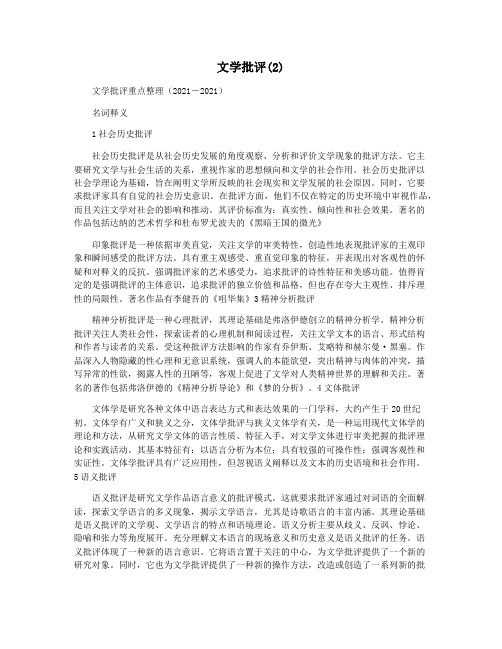
文学批评(2)文学批评重点整理(2021―2021)名词释义1社会历史批评社会历史批评是从社会历史发展的角度观察、分析和评价文学现象的批评方法。
它主要研究文学与社会生活的关系,重视作家的思想倾向和文学的社会作用。
社会历史批评以社会学理论为基础,旨在阐明文学所反映的社会现实和文学发展的社会原因。
同时,它要求批评家具有自觉的社会历史意识。
在批评方面,他们不仅在特定的历史环境中审视作品,而且关注文学对社会的影响和推动。
其评价标准为:真实性、倾向性和社会效果。
著名的作品包括达纳的艺术哲学和杜布罗尤波夫的《黑暗王国的微光》印象批评是一种依据审美直觉,关注文学的审美特性,创造性地表现批评家的主观印象和瞬间感受的批评方法。
具有重主观感受、重直觉印象的特征,并表现出对客观性的怀疑和对释义的反抗。
强调批评家的艺术感受力,追求批评的诗性特征和美感功能。
值得肯定的是强调批评的主体意识,追求批评的独立价值和品格,但也存在夸大主观性、排斥理性的局限性。
著名作品有李健吾的《咀华集》3精神分析批评精神分析批评是一种心理批评,其理论基础是弗洛伊德创立的精神分析学。
精神分析批评关注人类社会性,探索读者的心理机制和阅读过程,关注文学文本的语言、形式结构和作者与读者的关系。
受这种批评方法影响的作家有乔伊斯、艾略特和赫尔曼·黑塞。
作品深入人物隐藏的性心理和无意识系统,强调人的本能欲望,突出精神与肉体的冲突,描写异常的性欲,揭露人性的丑陋等,客观上促进了文学对人类精神世界的理解和关注。
著名的著作包括弗洛伊德的《精神分析导论》和《梦的分析》。
4文体批评文体学是研究各种文体中语言表达方式和表达效果的一门学科,大约产生于20世纪初。
文体学有广义和狭义之分,文体学批评与狭义文体学有关,是一种运用现代文体学的理论和方法,从研究文学文体的语言性质、特征入手,对文学文体进行审美把握的批评理论和实践活动。
其基本特征有:以语言分析为本位;具有较强的可操作性;强调客观性和实证性。
文学批评_精品文档

文学批评文学批评是对文学作品进行深入剖析和评价的一种理论活动,旨在发现文学作品的内在价值、审美特点和艺术手法,并对其进行评论、评价和解读。
文学批评的目的是通过对文学作品的研究,进一步了解文学的发展和演变,探索文学作品背后的意义和价值。
文学批评可以从不同的角度和方法来进行,如传统批评、结构主义批评、后现代主义批评等。
每种批评方法都有其独特的视角和理论基础,通过不同的批评方法可以对同一作品进行多维度的解读和评价。
在传统批评中,文学作品被视为艺术家的情感表达和思想沉淀。
传统批评强调对文学作品中的情节、人物、叙述手法等方面进行评价和解读。
该方法注重作品的主题和情感表达,通过对作品内部逻辑和结构的分析,揭示作品的深层意义和作者的意图。
传统批评主要关注作品的内部结构,认为作品中的每一个细节都有其特定的功能和意义。
结构主义批评强调文学作品的符号系统和结构关系。
结构主义批评认为文学作品是一种符号系统,通过对作品中的符号和结构进行分析,可以揭示作品的隐含意义和文化象征。
结构主义批评主要关注作品的符号和隐喻,通过对作品的结构关系和语言运用的分析,探索作品的象征意义和社会意蕴。
后现代主义批评强调文学作品的多样性和相对性。
后现代主义批评认为文学是一种游戏和模拟,文学作品的意义和价值是相对的。
后现代主义批评主要关注作品的多样性和文化差异,通过对作品的颠覆和重构进行分析,探索作品的多重解读和反思。
无论是传统批评、结构主义批评还是后现代主义批评,文学批评的目的都是通过对文学作品的解读和评价,加深对文学的理解和认识。
文学批评不仅可以帮助读者更好地欣赏作品,还可以在一定程度上推动文学的发展和创新。
文学批评对于文学的繁荣和发展起着重要的作用。
通过深入的批评分析和评价,可以挖掘出文学作品的潜力和创新,促进文学的进步和变革。
文学批评也可以帮助读者更好地理解和欣赏文学作品,提高阅读的品质和深度。
同时,文学批评还可以为文学界提供参考和借鉴,为文学创作和研究提供理论依据和方法指导。
文学批评PPT课件

黑格尔、别林斯基
“美学的观点和历史的观点”相统一
20
2、批评原则的科学性
第一,它以文学的双重本质为基础 第二,它以批评的双重观照为目的
21
(二)美学原则和历史原则的内涵
1、美学原则
文学批评的美学原则,要求批评家把文学 作品作为艺术的创造物,按照文学本身的美的 规律来加以认识和评价。
侧重于从创作主体即作家的方面来研究文学。
精神分析批评 弗洛伊德
26
(三)艺术本体批评
强调对作品本身的审美特征进行分析、研究。
俄国形式主义、英美新批评
雅各布森: “文学研究的对象不是文学,
而是文学性——即,使一部特定 作品成为文学作品的那种东西— —诗歌语言的特殊用法。”
27
(四)接受反应批评
二、文学批评的基本原则
(一)美学原则和历史原则的提出和科学性 (二)美学原则和历史原则的内涵
18
(一)美学原则和历史原则的提出和科 学性
1、批评原则的提出
恩格斯:
“我们决不是从道德的、党派的观点来责备歌德, 而只是从美学的历史的观点来责备他。”
“我是从美学的观点和历史的观点,以非常高的, 即最高的标准来衡量你的作品的。”
强调接受主体即读者接受活动的重要性。
接受美学 姚斯、伊瑟尔
28
四、文学批评的论述方法与阐释循环
(一)文学批评的论述方法 (二)文学批评中的阐释循环
29
(一)文学批评的论述方法
含义
文学批评的论述方法,就是批评家对作品本身的 思想艺术、作品产生的社会文化根源、作品的审美价 值以及历史地位进行分析评论时采用的基本方法。
文学理论(Ⅱ)
讲授
1
第七章 文学批评
《week文学批评》PPT课件

What is Literary Analysis?
It’s literary It’s an analysis It’s--An Argument! It may also involve research on and analysis of secondary sources
How is it “literary”?
2. In paragraph 4, Lorde describes the elaborate picnic her mother prepared for the trip to Washington, D.C. Why did Lorde's mother make such elaborate preparations? What do these preparations tell us about Lorde's mother?
There were probably two reasons. On the one hand, by taking a variety of food with them on the trip, the family members could save some money, for dining car food was too expensive. On the other hand, as black people, they were not allowed into railroad dining cars at that time.
5. While squinting up at monuments to freedom and past presidencies and democracy, the writer was wondering why the light and heat were both so much stronger in Washington D.C. than back home in New York City. Even the pavement on the streets was a shade lighter in color than back home. Any symbolic meaning?
文学批评教案-概述说明以及解释
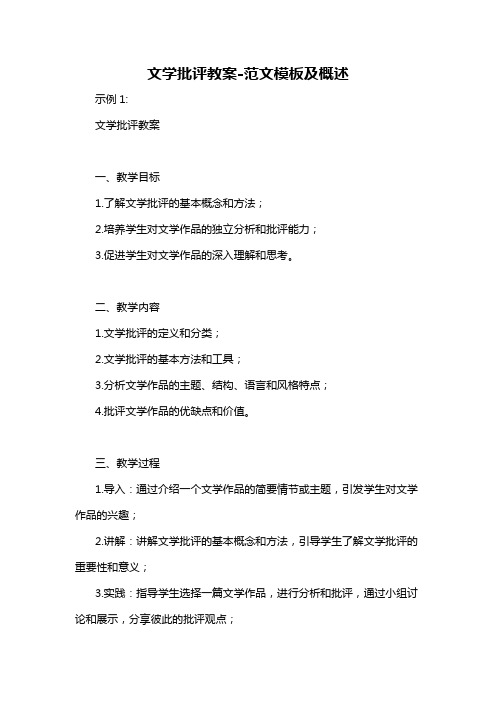
文学批评教案-范文模板及概述示例1:文学批评教案一、教学目标1.了解文学批评的基本概念和方法;2.培养学生对文学作品的独立分析和批评能力;3.促进学生对文学作品的深入理解和思考。
二、教学内容1.文学批评的定义和分类;2.文学批评的基本方法和工具;3.分析文学作品的主题、结构、语言和风格特点;4.批评文学作品的优缺点和价值。
三、教学过程1.导入:通过介绍一个文学作品的简要情节或主题,引发学生对文学作品的兴趣;2.讲解:讲解文学批评的基本概念和方法,引导学生了解文学批评的重要性和意义;3.实践:指导学生选择一篇文学作品,进行分析和批评,通过小组讨论和展示,分享彼此的批评观点;4.总结:总结各种文学批评方法的特点和适用范围,强调批评的客观性和理性。
四、教学评估1.课堂表现:观察学生在课堂上的表现,包括积极参与讨论、提出合理批评意见等;2.作业评价:对学生的文学批评作业进行评价,包括分析思路、文章结构、语言表达等方面的表现。
五、拓展延伸1.组织学生走进图书馆,通过查阅相关的文学批评理论和实践案例,提高对文学批评的认识和理解;2.邀请专业文学批评家或作家到课堂进行讲座或交流,让学生深入了解文学批评的前沿动态和实践经验。
六、课堂反思1.了解学生对文学批评的理解和反应,及时对教学内容和方法进行调整和改进;2.总结教学经验,不断提高自身的教学水平和能力,促进学生成长和发展。
示例2:文学批评教案是指教师在教授文学课程时使用的教学计划和方法。
在这个教案中,教师将教授学生如何进行文学批评,包括分析文学作品、探讨作者的写作技巧和主题、以及理解文学作品背后的文化和历史背景等。
首先,教师可以引导学生掌握文学作品的基本要素,包括人物、情节、主题、语言和风格等。
学生可以通过分析文本中的对话、动作和描写来了解作者对人物的塑造和情节的发展。
其次,教师可以教授学生如何运用不同的文学批评方法来分析文学作品。
例如,学生可以使用形式主义批评方法来分析作品的语言和结构,也可以运用历史主义批评方法来探讨作品所反映的历史和社会背景。
week文学批评培训资料
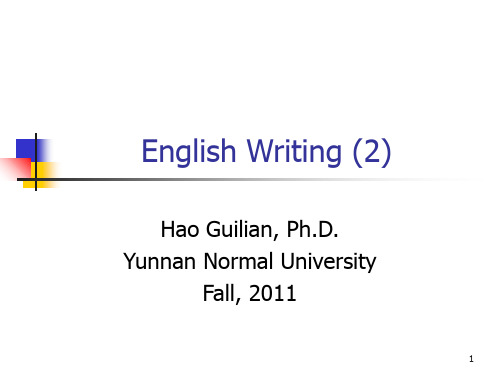
Marian Anderson had sung at the Lincoln Memorial, also because she wanted to spread Lincoln's noble ideas, to show that his noble ideas had not been realized and to call on people to fight against racial discrimination and segregation so as to make Lincoln's noble thought come true and win liberation and freedom for the black people.
English Writing (2)
Hao Guilian, Ph.D. Yunnan Normal University
Fall, 2011
1
In-class presentation
The outline of your essay writing:
What is the focus (studying point) of your essay?
3
Questions for Close Reading
1. What is the selection's thesis (or narrative point)? Locate the sentence(s) in which Lorde states her main idea. If she doesn't state the thesis explicitly, express it in your own words.
大学语文文学批评的基本理论
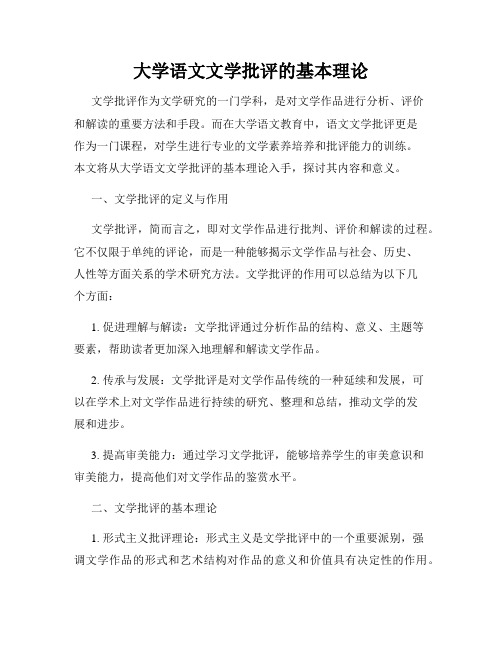
大学语文文学批评的基本理论文学批评作为文学研究的一门学科,是对文学作品进行分析、评价和解读的重要方法和手段。
而在大学语文教育中,语文文学批评更是作为一门课程,对学生进行专业的文学素养培养和批评能力的训练。
本文将从大学语文文学批评的基本理论入手,探讨其内容和意义。
一、文学批评的定义与作用文学批评,简而言之,即对文学作品进行批判、评价和解读的过程。
它不仅限于单纯的评论,而是一种能够揭示文学作品与社会、历史、人性等方面关系的学术研究方法。
文学批评的作用可以总结为以下几个方面:1. 促进理解与解读:文学批评通过分析作品的结构、意义、主题等要素,帮助读者更加深入地理解和解读文学作品。
2. 传承与发展:文学批评是对文学作品传统的一种延续和发展,可以在学术上对文学作品进行持续的研究、整理和总结,推动文学的发展和进步。
3. 提高审美能力:通过学习文学批评,能够培养学生的审美意识和审美能力,提高他们对文学作品的鉴赏水平。
二、文学批评的基本理论1. 形式主义批评理论:形式主义是文学批评中的一个重要派别,强调文学作品的形式和艺术结构对作品的意义和价值具有决定性的作用。
形式主义批评理论注重对作品的形式要素,如结构、语言、象征、节奏等进行分析和解读。
2. 结构主义批评理论:结构主义强调文学作品中的符号系统和结构性关系,将文学作品视为一种符号系统,并通过对符号的分析,揭示出作品中的隐含意义。
结构主义批评理论着重于研究作品中的二义性、象征和符号的用途。
3. 传统批评理论:传统批评理论往往关注作品的史诗、人物形象、故事情节等传统性的元素,强调作品的人文主义价值和文化内涵。
传统批评注重对文学作品中的情节、人物和主题的研究和评价。
4. 解构主义批评理论:解构主义批评强调文学作品中的二义性、矛盾和不确定性,主张对作品进行颠覆性的解读和剖析。
解构主义批评理论突破传统的解释方式,批判性地分析和解读文学作品,揭示出其中的隐含关系和意义。
5. 后现代批评理论:后现代批评理论是近年来发展起来的一种文学批评理论流派,对传统的批评模式进行了颠覆和重新构建。
week2文学批评25页PPT
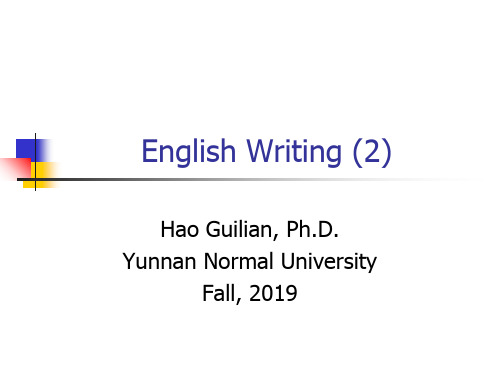
2. In paragraph 4, Lorde describes the elaborate picnic her mother prepared for the trip to Washington, D.C. Why did Lorde's mother make such elaborate preparations? What do these preparations tell us about Lorde's mother?
5. While squinting up at monuments to freedom and past presidencies and democracy, the writer was wondering why the light and heat were both so much stronger in Washington D.C. than back home in New York City. Even the pavement on the streets was a shade lighter in color than back home. Any symbolic meaning?
Marian Anderson had sung at the Lincoln Memorial, also because she wanted to spread Lincoln's noble ideas, to show that his noble ideas had not been realized and to call on people to fight against racial discrimination and segregation so as to make Lincoln's noble thought come true and win liberation and freedom for the black people.
- 1、下载文档前请自行甄别文档内容的完整性,平台不提供额外的编辑、内容补充、找答案等附加服务。
- 2、"仅部分预览"的文档,不可在线预览部分如存在完整性等问题,可反馈申请退款(可完整预览的文档不适用该条件!)。
- 3、如文档侵犯您的权益,请联系客服反馈,我们会尽快为您处理(人工客服工作时间:9:00-18:30)。
Hao Guilian, Ph.D. Yunnan Normal University
Fall, 2019
In-class presentation
The outline of your essay writing:
What is the focus (studying point) of your essay?
Marian Anderson had sung at the Lincoln Memorial, also because she wanted to spread Lincoln's noble ideas, to show that his noble ideas had not been realized and to call on people to fight against racial discrimination and segregation so as to make Lincoln's noble thought come true and win liberation and freedom for the black people.
Questions for Close Reading
1. What is the selection's thesis (or narrative point)? Locate the sentence(s) in which Lorde states her main idea. If she doesn't state the thesis explicitly, express it in your own words.
2. In paragraph 4, Lorde describes the elaborate picnic her mother prepared for the trip to Washington, D.C. Why did Lorde's mother make such elaborate preparations? What do these preparations tell us about Lorde's mother?
Important literary concepts
The Basics
Other key concepts
Plot
Historical context
Setting Narration/point of view Characterization Symbol Metaphor Genre Irony/ambiguity
Here, most probably, the white light and heat and the white pavement on the streets symbolize the white domination. Actually, the writer was wondering why the white domination or racial discrimination was even stronger in Washington D.C. than back home in New York City.
Social, political, economic contexts
Ideology Multiple voices Various critical
orientations Literary theory
What is an Analysis?
An analysis of a literary work may discuss
4.Why did the writer spend the whole next day after Mass squinting up at the Lincoln Memorial?
And why had Marian Anderson sung at the Lincrefused to allow her to sing in their auditorium because she was Black?
3. Why had the writer's elder sister been prevented from going to Washington D.C. with her high school classmates?
Because she was black and all her classmates were white and they would be staying in a hotel which did not rent rooms to Negroes.
There were probably two reasons. On the one hand, by taking a variety of food with them on the trip, the family members could save some money, for dining car food was too expensive. On the other hand, as black people, they were not allowed into railroad dining cars at that time.
7. How did the writer feel after the injustice?
The writer was plunged into extreme exasperation and was going to write a letter of protest to the president of the USA. This profound experience of white domination, racial discrimination and segregation so deeply affected the writer that she felt sick to her stomach for the rest of that trip. She didn't think that it was much of a graduation present after all.
How did you organize it? What standard did you have when you came
to judge it the way you did? What is your conclusion?
Read the essay together!
THE FOURTH OF JULY (By Audre Lorde)
How is a literary analysis an argument?
When writing a literary analysis, you will focus on specific attribute(s) of the text(s).
When discussing these attributes, you will want to make sure that you are making a specific, arguable point (thesis) about these attributes.
How is it “literary”?
Usually, a literary analysis will involve a
discussion of a text as writing, thus
literary, which means “having to do with letters” This will involve the use of certain concepts that are very specifically associated with literature
It was Lincoln, the American President, who liberated the blacks in America, who advocated freedom for the colored and who even sacrificed his life for the emancipation of the black people. Both the writer and Marian Anderson cherished the memory of this great man.
6. How did the writer's parents and her two sisters respond to the unfair treatment afterwards?
The writer's parents wouldn't speak of the injustice, not because they had contributed to it, but because they felt they should have anticipated it and avoided it. Neither her parents nor her sisters demonstrated the rage they felt inwardly; instead, they all pretended that nothing unusual and anti-American had occurred.
You will defend this point with reasons and evidence drawn from the text. (Much like a lawyer!)
